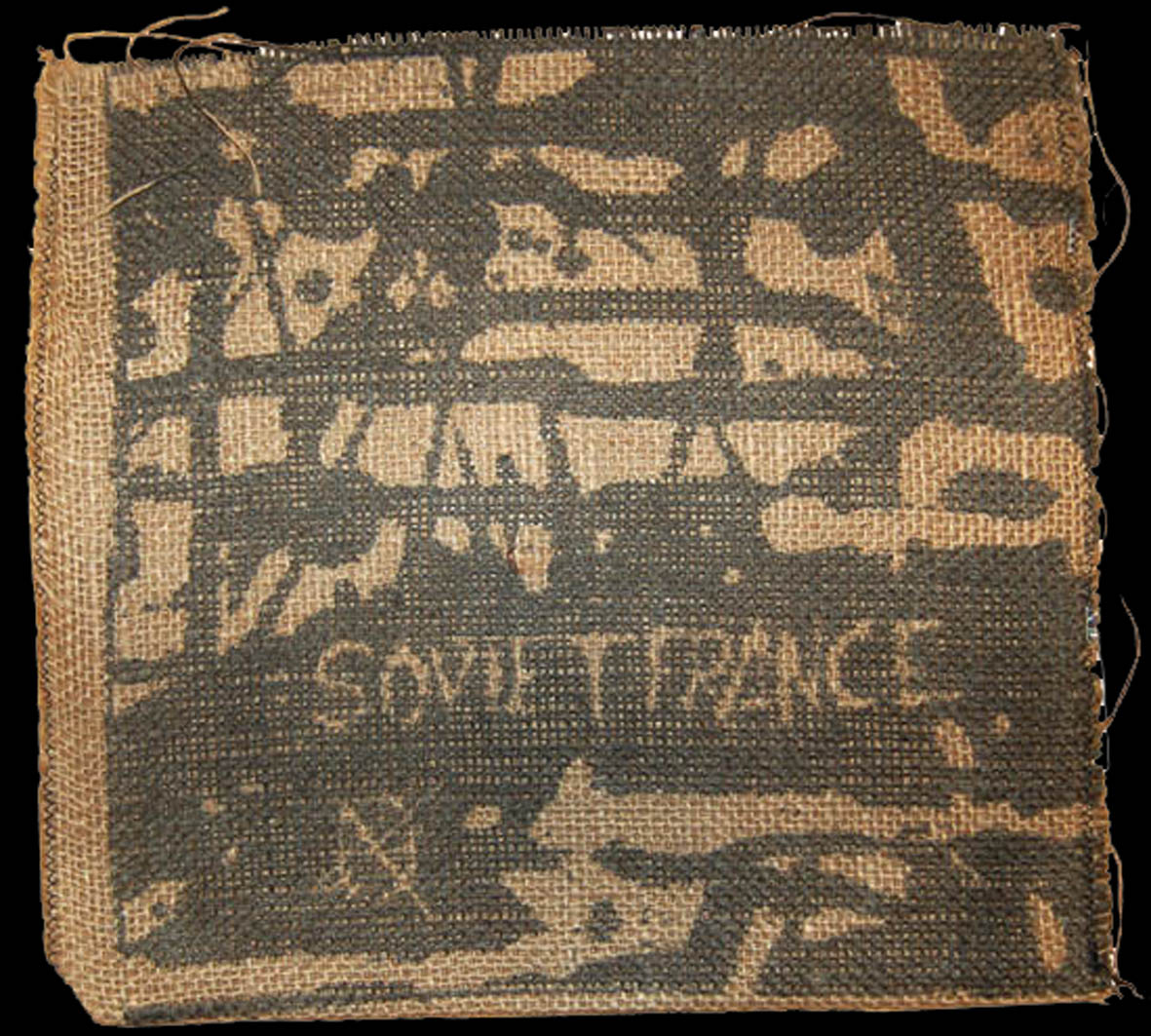Zoviet France, "Untitled"
 This 1982 album was Zoviet France's second release and has come to be known by a few different names over the years, most prominently "Hessian" (an English synonym for burlap).  The reason for that is simple: the original LP was packaged in screen-printed burlap, making it ZF's first foray into the bizarre packaging that they came to be known for in the '80s.  Of course, the music within is also quite bizarre, even by the band's own extremely outré standards.  There are certainly some clear hints of the faux-tribalism and tape loop experiments that would eventually solidify as Zoviet France's aesthetic (for a while anyway), but this enthusiastically primitive affair also features some very unexpected twists, such as absurdist humor, recognizable guitars, howled vocals, and (unbelievably) slap bass.
This 1982 album was Zoviet France's second release and has come to be known by a few different names over the years, most prominently "Hessian" (an English synonym for burlap).  The reason for that is simple: the original LP was packaged in screen-printed burlap, making it ZF's first foray into the bizarre packaging that they came to be known for in the '80s.  Of course, the music within is also quite bizarre, even by the band's own extremely outré standards.  There are certainly some clear hints of the faux-tribalism and tape loop experiments that would eventually solidify as Zoviet France's aesthetic (for a while anyway), but this enthusiastically primitive affair also features some very unexpected twists, such as absurdist humor, recognizable guitars, howled vocals, and (unbelievably) slap bass.
Red Rhino/Charrm
While three decades admittedly passed between this LP and last year's 7.10.12, it is still somewhat remarkable that roughly the same band is responsible for both, as this clattering, humorous, anything-goes chaos could not possibly be more different than the austere minimal drones of Zoviet France's current work.  The only real constants seem to be a fascination with loops, a deep aversion to anything song-like, a penchant for the cryptic, and Ben Ponton.  I suspect Ben and his fellow conspirators (Robin Storey, Peter Jensen, and Lisa Hale, in this case) are probably a bit embarrassed by this period in their development now, but "Hessian" seems like it was probably a lot of fun to record and it makes for a very interesting snapshot of the group's origins.
The most fascinating pieces for me are naturally the more aberrant ones, such as the opening "Ritual," which shares a lot of common ground with precursors like Throbbing Gristle and contemporaries like Test Dept. and SPK.  After a lengthy introduction of humming machine-like noise and instrumental blurts and squawks, a rumbling, detuned bass bulldozes its way into the proceedings along with an insistent thud-thud-thud beat, a strangled-sounding guitar, and plenty of guttural, wordless howling.  It is impressively heavy, but heavy in a messy, unhinged, "noise rock" kind of way, and its formula is never repeated again.
Equally strange and divergent is the closing "Ji Boys," which combines the album's recurring sample of a thickly accented (Indian?) man saying "ok boys" with "funky" slap bass, bongos, dissonantly chromatic piano, and stabs of processed guitar.  Then, around the halfway point, the bottom drops out and it sounds like a post-punk band jamming underwater with a broken drum machine.  In fact, it is so bizarre, anachronistic, and disjointed that it ambiguously rides the blurry line between "inspired deconstruction" and "a bunch of guys messing around in a studio."  In either case, it either sounds like an inept Pop Group rip-off or a hilarious Pop Group caricature.  Curiously, the group thought enough of it to expand it when the album was eventually reissued on CD in 1990.
As bizarre as "Ji Boys" is, it still does not hold a candle to the weirdness of "Bring Hessa," which is little more than the phrase "bring in chiefs!" repeated obsessively.  It could easily be viewed as mere filler or a throw-away bit of lunacy, but it is uniquely compelling nonetheless: the main voice is so maniacal and Muppet-like that it makes it very difficult for the other vocalists to continue without laughing, creating a hesitation/stutter that initially seems like fear or a choked sob.  Then, around the halfway point, the chant amusingly turns into a frenzied "take out chiefs!" until it finally concludes (with the announcement that the chiefs are now gone, of course).  While it definitely offers absolutely nothing musical nor anything more substantial than that at all, I enjoyed it a lot anyway–-it is fun to catch a glimpse of such a mysterious and generally very serious band acting so ridiculously (and so atypically human).
The remaining three pieces ("Mudbast Boys," "Sem Boys," and "Mounw") are a bit more traditionally "Zoviet France," albeit a bit primitive and rooted in rock instrumentation.  "Mudbast Boys" is essentially a beatless, dubbier version of "Ji Boys" based upon insistently repeating "ok boys" sample, while "Mounw" is a very minimal soundscape built upon little more than a low rumble and some periodic metallic clatter.  "Sem Boys," however, is a fairly effective proto-version of ZF's distinctive faux-exoticism despite being executed in the most low-tech possible way (it basically sounds like ragged chanting, someone playing a bucket or hand-drum, and some distinctly unvirtuosic snatches of violin and flute).
As uneven and unsophisticated as it is, "Hessian" is still a remarkably charming effort due to its sheer enthusiasm and naked experimentalism.  It should probably be avoided by the merely curious, as it is not particularly representative of Zoviet France's aesthetic (nor does it come close to approaching their best work quality-wise), but more serious fans will likely find it to be an entertaining historic curiosity.  I also found it to be perversely inspiring, as the band clearly had a muddy vision, dubious musical ability, and rudimentary equipment, but made a messy, scrappy stab at greatness anyway and kept at it until they cohered into the iconic entity they are remembered as today.  To their credit, they certainly cohered quickly, as the more distinctive and superior Garista was actually recorded the same month (December 1981).



